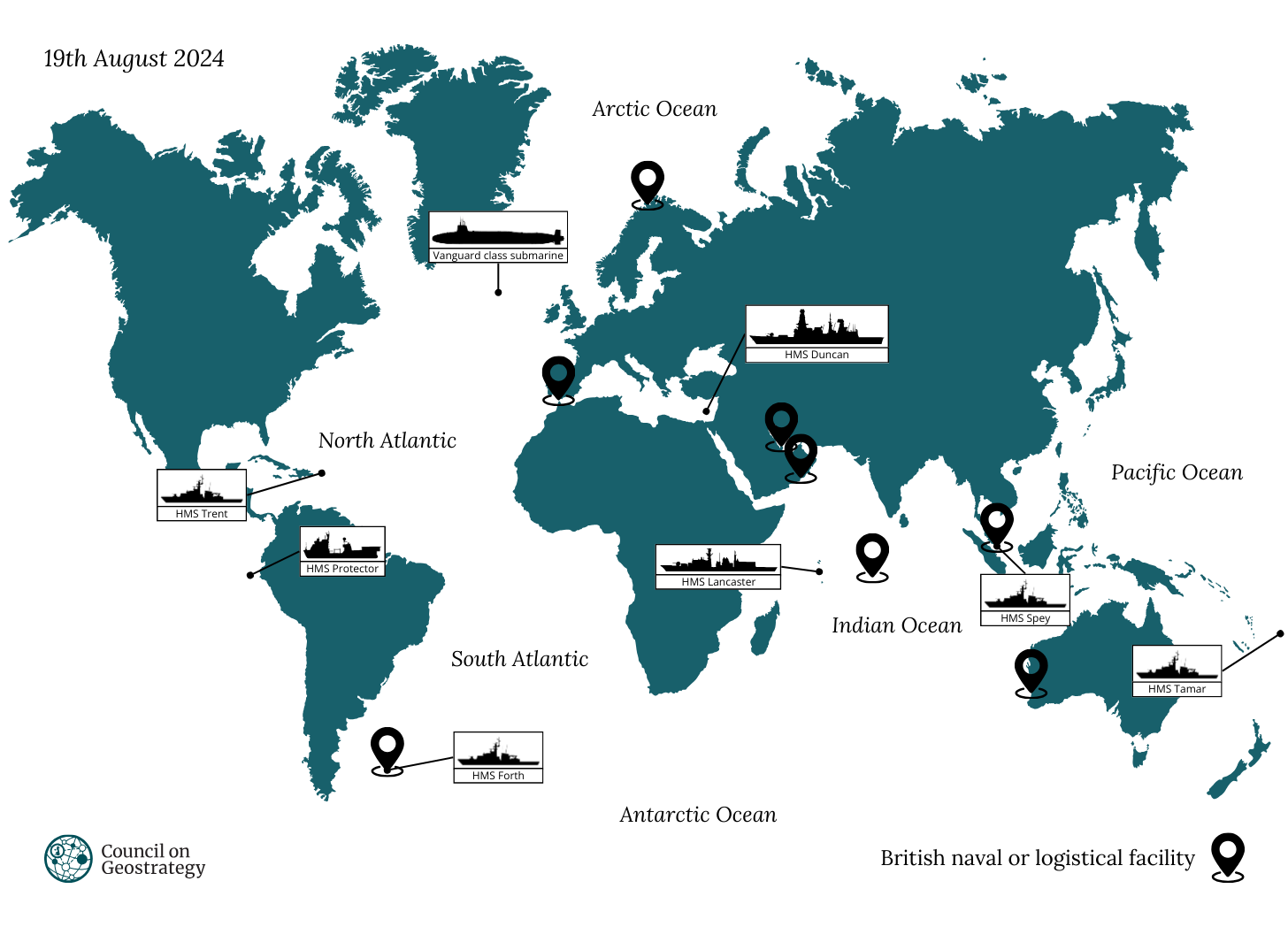Welcome to the seventh Cable, our weekly roundup of British foreign and defence policy. The Cable is published every Monday at 12:00.
We have seen another flurry of activity in the realm of the United Kingdom’s (UK) foreign and defence policy. Last week, with the ever-present risk of the conflict in the Middle East descending into a regional war, His Majesty’s (HM) Government issued a joint statement with several key allies, calling for a ceasefire, regional de-escalation, the freeing of hostages and unfettered access of aid to Gaza.
In tandem with the joint statement, Sir Keir Starmer, Prime Minister, spoke with the leaders of Egypt and Iran to reiterate British support for ceasefire talks and to call on Iran not to retaliate against Israel following the recent assassinations of Hamas and Hezbollah leaders.
Moving to Europe, the Ministry of Defence (MOD) has confirmed that Ukraine is free to use British weapons on Russian soil. However, long-range missiles – such as the Storm Shadow cruise missile – remain restricted. A spokesperson for the MOD stated that Kyiv has a ‘clear right of self-defence against Russia's illegal attacks...that does not preclude operations inside Russia.’ It has been confirmed that Ukrainian troops have used British Challenger 2 tanks during their current offensive, and it is likely that other British weapons are being used in Russian territory.
In other news, the UK has been taking part in multilateral military exercises across the Indo-Pacific this summer. These deployments saw British personnel operate alongside nearly 30 international partners. In Australia, Royal Marines, Royal Air Force (RAF) and Royal Navy personnel took part in several different training operations. In Hawaii, two RAF P8A Poseidon aircraft took part in the (RIMPAC) exercises. And in India, the RAF is taking part in the South Asian country’s largest ever multinational air exercise.
In a statement on these exercises, John Healey, Secretary of State for Defence, reminded that: ‘Euro-Atlantic security is inextricably linked to stability in the Indo-Pacific. These deployments…strengthen our bonds and interoperability with our important partners.’ British interests in the Indo-Pacific are well served by the new government demonstrating its commitment to regional security.
How Britain is seen overseas
The Polish Institute of International Affairs published an article analysing the political impact that ‘anti-establishment’ parties will have on the new British government. The article points out that Labour won the July General Election with a broad but shallow coalition, while anti-establishment parties gained significant support. The article suggests that this could limit Starmer’s room to manoeuvre on various foreign policy issues, due to the risk of losing support to anti-establishment parties on the left and the right. This is particularly salient on issues of immigration, relations with the European Union and the Gaza war. The article also states that there is a chance that anti-establishment forces could undermine the British consensus around support for Ukraine.
How competitors frame Britain
The Global Times published an article ‘analysing’ the recent street violence in England and Northern Ireland. The piece blames poor economic growth and rising inequality with difficult to reconcile differences between different ethnic communities. A case of deflection? After all, Beijing’s attitude to minority rights is downright dystopian.
Russia Today reported on an interview with Andrey Kelin, Ambassador of Russia to the UK, in which he stated that relations between London and Moscow remain at a ‘crisis level’. The ambassador lamented the Labour government’s replication of the previous Conservative government’s ‘anti-Russia bias’. Rendering oneself a pariah state comes with many disadvantages.
Tracking the Royal Navy’s global deployments
Though invisible, the Royal Navy’s ballistic missile nuclear submarine was deterring the gravest threats to British interests from the depths of the North Atlantic last week. HMS Richmond returned to Portsmouth after patrolling Northern waters, while HMS Protector steamed past Ecuador en-route to the Antarctic. HMS Duncan remains in the eastern Mediterranean with a United States Navy task group.
In other parts of the world, HMS Lancaster paid a visit to the Seychelles, where it hosted a delegation from the Seychelles Government. Offshore patrol vessels HMS Forth, HMS Trent, HMS Medway, HMS Spey and HMS Tamar were busy as ever. HMS Forth remains in the Falkland Islands protecting British interests, HMS Trent is in the British Virgin Islands to help clear up after Hurricane Ernesto, HMS Medway entered Portsmouth, HMS Spey is undergoing maintenance at the British logistics facility in Singapore, and HMS Tamar visited Lautoka, Fiji.
How Britain thinks about foreign affairs
Last week, BAE Systems announced it has begun manufacturing a ‘demonstrator’ of the next generation fighter jet being developed via the Global Combat Air Programme (GCAP) with Japan and Italy. This will be the first crewed combat air demonstrator to be built in Britain in four decades and will enhance British industry’s expertise in advanced technologies such as stealth components. The MOD is also enacting plans to develop other advanced capabilities, including the Deep Space Advanced Radar Capability (DARC), and has announced £1 billion in funding to accelerate British efforts to produce homegrown hypersonic missile technology. Both projects are being developed alongside AUKUS partners, Australia and the United States (US).
Implications
Britain’s requirement for advanced military capabilities is clear given the current geopolitical environment. However, with defence spending unlikely to rise above 2.5% of gross domestic product (GDP) and with a multitude of other capital intensive commitments, the UK will struggle to maintain its position at the cutting edge of technological innovation independently.
For some time, HM Government has looked to minilateralism to catalyse and multiply its strategic and defence-industrial objectives. Minilateralism brings together small groups of nations to collaborate on specific goals or tackle specific issues. In the latter part of the 20th century, the UK, alongside western European partner nations, developed the Panavia Tornado strike aircraft and the Eurofighter Typhoon fighter jet – both highly capable warplanes which served British interests for decades.
The success of these minilateral programmes drives HM Government to pursue minilateral partnerships in the 21st century. Spreading the costs and sharing expertise and industrial capacity, defence-industrial minilateralism consolidates economic, political and military ties with close allies.
While necessity is part of the equation, minilateral groupings can also provide compound advantages. This can come in the form of the broader development of advanced capabilities, with AUKUS partner nations cooperating on a number of cutting-edge technologies, or through enhancing Britain’s strategic position by aligning like-minded nations to shape international security and solidify British influence overseas. This can be seen with the Joint Expeditionary Force (JEF), the Five Eyes and the Five Power Defence Arrangements (FPDA).
As it develops its defence-industrial partnerships, HM Government would do well to think harder about how minilateralism helps the UK secure strategic advantage, as well as its broader strategic objectives.
If you found this Cable useful, please subscribe or pledge your support!
What do you think about this Cable? Why not leave a comment below?






